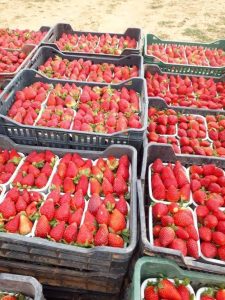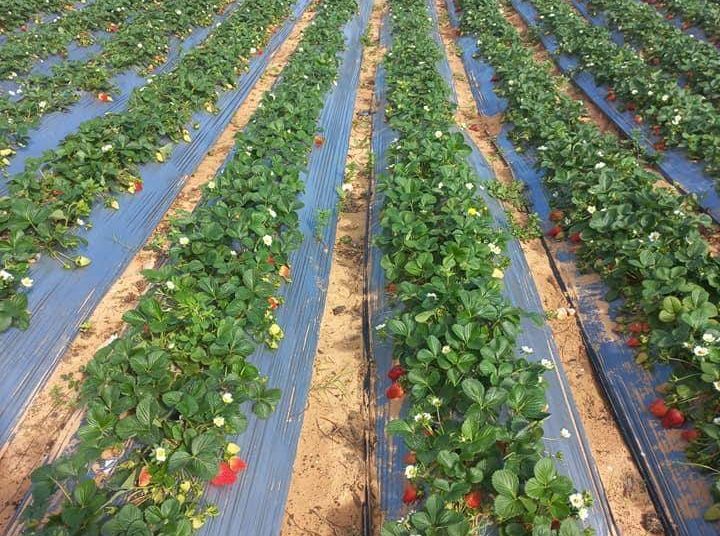Seasonal strawberry cultivation in Libya is a thriving economic resource. From early spring to early to mid-summer, strawberry sellers litter roadsides. Its eaten fresh but also whizzed into smoothies and milkshakes.
Libyan Arable land in general is very limited and does not exceed 10 percent of the country’s area, which is approximately 15.4 million hectares out of the size of Libya’s area, estimated at 176 million hectares.
More than 5,000 hectares used for strawberry cultivation in western Libya
The areas cultivated seasonally with strawberries in the west of the country are estimated at more than five thousand hectares. These are distributed over the cities of Misrata, Zliten, the areas of Qasr Khiar, Al-Qarabouli and Tajoura east of Tripoli, Qasr Bin Ghashir and Sidi Al-Sayeh to the southeast of it, in addition to the south of Janzour and the cities of Saadia, Nasiriyah, Al-Zawiya, Surman and Sabrata.

FB page).
Strawberries yield a good economic return
Speaking exclusively to Libya Herald, agricultural engineer Hatem Saad al-Magri, who specializes in growing strawberries and seasonal crops, said that strawberries are crops with a good economic return. This return can be increased by working on producing the crop at the right time for export, which starts from November to April.
Fruits must reach consumer in optimal condition
He stressed the need to take care of producing fruits with desirable horticultural specifications that are free from biological and chemical pollution. There is also the need to take care of collection, packaging, cooling and transport operations, which leads to the fruits reaching the consumer in an attractive way and raising their marketing value.
Small frozen quantities are exported to Tunisia
Hatem al-Magri referred to the cultivation of strawberries with locally produced seedlings under the supervision of agricultural engineers of the recommended varieties. The needs of farmers are provided by agricultural seed companies in Libya. Small frozen quantities are also provided for export annually to Tunisia, through companies specialized in delivery, packaging and freezing.
Winter v summer cultivation
He added that fresh strawberry seedlings are planted in September and October to produce the early crop for export, which begins in November until May. This system is called winter cultivation. As for the other system, which is called summer cultivation, it is cultivated with frozen seedlings that were stored in refrigerators for about seven months, where planting begins in August, and harvesting begins in March until July.
Coastal region suitable for strawberry cultivation
With regard to the lands most suitable for strawberry cultivation, he said that the areas of Tajura, Al-Garabouli, Gaser Khiar east of Tripoli, the Sidi Al-Sayeh area, Gasr Ben Ghashir south of it and the whole coastal region are good for strawberry production. This is due to suitable soil, humid Mediterranean climate, and abundance of groundwater.
High demand for strawberries
Al-Magri said strawberry cultivation has a good economic return, as it is a source of livelihood for many farm owners as well as marketers and sellers in the local market, with high demand for it, especially from cafes, restaurants, natural juice shops, as well as home consumption.
He stressed that the cultivation of strawberries is carried out by Libyan hands, to a large extent, for ease of handling and care, noting the lack of use of medicines and chemical fertilizers, which makes local strawberries safer for the consumer than the imported frozen varieties.
Supply can meet local demand
Regarding the ability of local farms to provide the required quantities to consumers locally, he said that it is possible to cover the local market to a large extent, and a surplus can be achieved for export abroad, provided that the supply of electric power to farms is stable, along with the provision of refrigerators, preservation materials, and packaging at good prices.
No government support
On the role of the Ministry of Agriculture and the government in supporting this activity, he said that the Libyan farmer lacks the support and encouragement of the successive Libyan governments, especially the Ministry of Agriculture. He said this type of agriculture does not require large material costs and can be carried out with minimal capabilities.
Strawberry cultivation, he explained, is an economic cultivation that achieves a quick and large return, especially if other industries are established on it, such as the manufacture of juices and natural jam.








